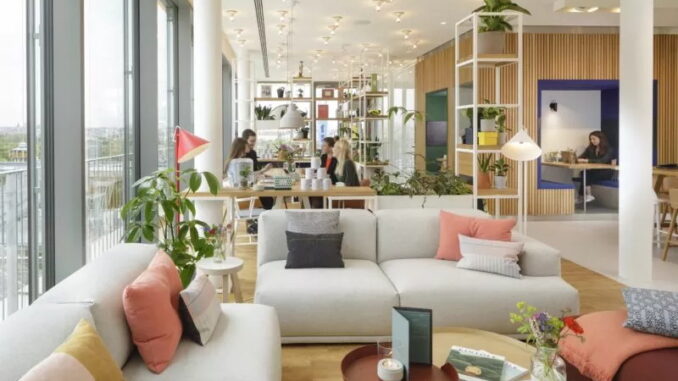
With the ongoing urbanisation, the accompanying housing shortage in metropolitan areas and the changing lifestyles especially of the young generations X and Z (more flexibility, less bondage to a specific place of residence), co-living has become more and more integrated into the real estate market within the last years. Co-living can be defined as a mixed concept of hotel and permanent residence for different target groups.
The focus of these concepts lies hereby on the attractive design of the public areas. One target group are digital nomads and young professionals who can work independently of their location and usually stay in a particular city for a few months before moving on and working from another location. In addition, the concepts are well suited for professionals who stay for a few months (e.g., for project work) or who newly moved to a city and use the co-living concept as a (temporary) residence. Brokerage fees, costs for furniture, as well as the challenge of quickly finding affordable living space are eliminated in this case.
The size of fully furnished co-living units for single use is usually between 17 and 40 square meters. It is therefore important to design and furnish the studios as efficiently as possible, with the end users of course always being the focus. Natural daylight (ideally provided by large windows) and light colours of furniture help to visually enlarge the studios. The dimensions of the work surfaces of standardised kitchenettes are usually around 1.60 by 0.6 meters. Kitchenettes usually consist of two cooking plates, a microwave, a refrigerator and storage space. While shared kitchens are a good alternative, kitchenettes in units are important for residents to maintain a degree of flexibility and independence, especially during long-term stays. Communal kitchens are therefore often seen more as a supplement to individual kitchenettes.

Zoku Loft
While beds on the one hand must ensure a certain size (usually queen-size) and comfort, these take up a lot of space in the small units. Therefore, Zoku, an aparthotel/co-living operator from the Netherlands, came up with an effective solution to this by moving the position of the bed up in height. The stairs leading to the bed can be retracted to save additional space. In addition, the bed is protected from view, which visually creates a separate bedroom and additional privacy can be ensured. A ceiling height of at least 2.60 meters is a prerequisite for this solution.
Another way of making efficient use of limited space is realized in the Stay KooooK units. Although the concept falls under the category of serviced apartments, the size and furniture of the studios are comparable to those of the co-living units. With the help of a moveable wall, the size of the sleeping or kitchen area can be adjusted individually according to actual needs.
When designing the units, attention should also be paid to offering sufficient storage space. This is primarily provided under the bed or under the ceiling and in cabinets. Many co-living concepts also offer the option of renting storage space in the basement. With a size of between 3 and 4 square meters (including toilet, sink and walk-in shower), bathrooms are kept relatively compact. Due to the often tubular layout of the units, there is usually no daylight in the bathrooms, making an appropriate ventilation system essential.
In addition, the attractive design of the public areas, which usually account for 15 to 20 percent of the gross floor area, is crucial to the success of co-living concepts. The idea behind co-living is that residents spend most of their time in common areas. Co-working, rooftop terraces, gyms, communal kitchens, small cinemas and event spaces are just a few examples. For regular occupancy of the spaces, it is therefore important that residents can communicate with each other (e.g., through an app) so that they can arrange to meet for joint activities.
Events such as yoga classes or panel discussions, can be communicated via this app and give residents the opportunity to register. The app also helps new residents in getting to know other people with similar interests more easily. Since co-living already focuses on sustainability by sharing different resources (e.g., washing machines, household appliances, etc.), the topic naturally also plays a decisive role in planning and construction. This can also be supported by the smart integration of technologies. For example, during a test phase, small displays showing the water temperature and general energy and water consumption were installed in the showers of The Social Hub (formerly The Student Hotel). In addition, the display shows a polar bear on polar ice, which melts as the shower continues. This playful effect led to a 17% decrease in hot water consumption in the units.
The combination of technologies and sustainability, an attractive design of the public areas and efficient planning and furnishing of the studios are therefore elementary components of successful co-living concepts.

Tobias Siegel is a Consultant with the PKF hospitality group.
As part of the PKF hospitality group, PKF livingexperts has been involved with serviced living concepts (including co-living, student accommodation, senior living, etc.) for years. Therefore, PKF hospitality is organizing the 196+ spotlight serviced living on 12.06.2023 in Vienna, where topics such as architecture, design and digitalization will be in the focus.
In addition, the 196+ forum Milan – Italy’s benchmark event for the topic of architecture and design in hospitality – will take place from 16 – 17 April 2023. The 196+ forum Milan is an international networking platform where industry participants come together to exchange ideas. It includes a full-day conference with expert discussions, interactive formats, topical case studies and networking opportunities.
This article originally appeared on PKF Hospitality.

Leave a Reply